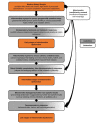Metabolic Strategies in Healthcare: A New Era
- PMID: 35656107
- PMCID: PMC9116908
- DOI: 10.14336/AD.2021.1018
Metabolic Strategies in Healthcare: A New Era
Abstract
Modern healthcare systems are founded on a disease-centric paradigm, which has conferred many notable successes against infectious disorders in the past. However, today's leading causes of death are dominated by non-infectious "lifestyle" disorders, broadly represented by the metabolic syndrome, atherosclerosis, cancer, and neurodegeneration. Our disease-centric paradigm regards these disorders as distinct disease processes, caused and driven by disease targets that must be suppressed or eliminated to clear the disease. By contrast, a health-centric paradigm recognizes the lifestyle disorders as a series of hormonal and metabolic responses to a singular, lifestyle-induced disease of mitochondria dysfunction, a disease target that must be restored to improve health, which may be defined as optimized mitochondria function. Seen from a health-centric perspective, most drugs target a response rather than the disease, whereas metabolic strategies, such as fasting and carbohydrate-restricted diets, aim to restore mitochondria function, mitigating the impetus that underlies and drives the lifestyle disorders. Substantial human evidence indicates either strategy can effectively mitigate the metabolic syndrome. Preliminary evidence also indicates potential benefits in atherosclerosis, cancer, and neurodegeneration. Given the existing evidence, integrating metabolic strategies into modern healthcare systems should be identified as a global health priority.
Keywords: atherosclerosis; cancer; carbohydrate-restricted diets; fasting; health; metabolic syndrome; metabolism; mitochondria dysfunction; neurodegeneration.
Copyright: © 2022 Phillips et al.
Conflict of interest statement
Conflicts of interest The author declares no conflict of interest.
Figures



Similar articles
-
Mitochondrial biogenesis: pharmacological approaches.Curr Pharm Des. 2014;20(35):5507-9. doi: 10.2174/138161282035140911142118. Curr Pharm Des. 2014. PMID: 24606795
-
Targetable Pathways for Alleviating Mitochondrial Dysfunction in Neurodegeneration of Metabolic and Non-Metabolic Diseases.Int J Mol Sci. 2021 Oct 23;22(21):11444. doi: 10.3390/ijms222111444. Int J Mol Sci. 2021. PMID: 34768878 Free PMC article. Review.
-
Insulin resistance and endothelial dysfunction: the road map to cardiovascular diseases.Diabetes Metab Res Rev. 2006 Nov-Dec;22(6):423-36. doi: 10.1002/dmrr.634. Diabetes Metab Res Rev. 2006. PMID: 16506274 Review.
-
Therapeutic Strategies for Mitochondrial Dysfunction and Oxidative Stress in Age-Related Metabolic Disorders.Prog Mol Biol Transl Sci. 2017;146:13-46. doi: 10.1016/bs.pmbts.2016.12.012. Epub 2017 Feb 1. Prog Mol Biol Transl Sci. 2017. PMID: 28253984 Review.
-
Integration of Artificial Intelligence, Blockchain, and Wearable Technology for Chronic Disease Management: A New Paradigm in Smart Healthcare.Curr Med Sci. 2021 Dec;41(6):1123-1133. doi: 10.1007/s11596-021-2485-0. Epub 2021 Dec 24. Curr Med Sci. 2021. PMID: 34950987 Free PMC article.
Cited by
-
Development and validation of a copper-related gene prognostic signature in hepatocellular carcinoma.Front Cell Dev Biol. 2023 Jul 18;11:1157841. doi: 10.3389/fcell.2023.1157841. eCollection 2023. Front Cell Dev Biol. 2023. PMID: 37534104 Free PMC article.
-
Time-Restricted Ketogenic Diet in Huntington's Disease: A Case Study.Front Behav Neurosci. 2022 Jul 29;16:931636. doi: 10.3389/fnbeh.2022.931636. eCollection 2022. Front Behav Neurosci. 2022. PMID: 35967897 Free PMC article.
-
Recognizing the Role of Insulin Resistance in Polycystic Ovary Syndrome: A Paradigm Shift from a Glucose-Centric Approach to an Insulin-Centric Model.J Clin Med. 2025 Jun 6;14(12):4021. doi: 10.3390/jcm14124021. J Clin Med. 2025. PMID: 40565766 Free PMC article. Review.
-
KETO-MOOD: Ketogenic Diet for Microbiome Optimization and Overcoming Depression - A Protocol for a Randomized Controlled Trial.Neuroimmunomodulation. 2025;32(1):36-48. doi: 10.1159/000542979. Epub 2024 Dec 19. Neuroimmunomodulation. 2025. PMID: 39701054 Free PMC article.
-
Time-restricted ketogenic diet in amyotrophic lateral sclerosis: a case study.Front Neurol. 2024 Jan 18;14:1329541. doi: 10.3389/fneur.2023.1329541. eCollection 2023. Front Neurol. 2024. PMID: 38304328 Free PMC article.
References
-
- James DG (1982). The Hunterian oration on Louis Pasteur’s final judgement. Host reaction, soil or terrain. Trans Med Soc Lond, 99-100:131-147. - PubMed
-
- Eckel RH, Grundy SM, Zimmet PZ (2005). The metabolic syndrome. Lancet, 365:1415-1428. - PubMed
-
- Libby P, Buring JE, Badimon L, Hansson GK, Deanfield J, Bittencourt MS, et al.. (2019). Atherosclerosis. Nat Rev Dis Primers, 5:56. - PubMed
LinkOut - more resources
Full Text Sources
Miscellaneous
